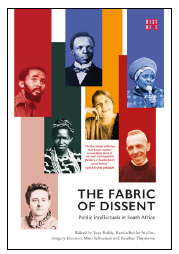Services on Demand
Article
Indicators
Related links
-
 Cited by Google
Cited by Google -
 Similars in Google
Similars in Google
Share
South African Journal of Science
On-line version ISSN 1996-7489
Print version ISSN 0038-2353
S. Afr. j. sci. vol.118 spe 2 Pretoria 2022
http://dx.doi.org/10.17159/sajs.2022/14896
BOOK REVIEW
Public intellectuals. Thoughts into action
Keyan G. Tomaselli
Dean's Office, Faculty of Humanities, University of Johannesburg, Johannesburg, South Africa EMAIL: Keyant@uj.ac.za

BOOK TITLE: The fabric of dissent: Public intellectuals in South Africa
EDITORS: Vasu Reddy, Narnia Bohler-Muller, Gregory Houston, Maxi Schoeman, Heather Thuynsma
ISBN: 9781928246404 (paperback, 478 pp)
PUBLISHER: Best Red, Cape Town, South Africa; ZAR387
PUBLISHED: 2020
The euphoria of the liberation moment heralded by the 1994 transition from apartheid to democracy had almost completely dissipated by 2020. The 'liberators' had become the new largely unaccountable consumptive political new class and had all but drained the economy and undermined democracy. The many thousands of public intellectuals who had put their lives on the line to effect positive change until then had been either absorbed by the new elite, or largely forgotten, marginalised, or lost from the public mind.
This inaugural book attempts to recover the respective contributions of 77 prominent anti-apartheid dissidents -the more dominant voices (p. 7) - and to bring them back into public focus. Prior books doing this in a different way include those by Ntongela Masilela1 and Chris Broodryk2. Masilela studied the 350+ African writers who from the late 1800s until 1960 helped South Africa to negotiate an African entrance into modernity. The Broodryk volume is much more modest, but highly analytical, and develops conceptual frameworks within which the descriptive entries of the Reddy volume might be read.
The Fabric of Dissent is a massive compendium with short, highly informative essays on the personalities selected. They are sourced from across the racial, ethnic, language and class spectrum. Following the rather densely written introduction, Part I covers 25 Political Public Intellectuals. Part 2 examines 21 Cultural Public Intellectuals. Part 3 works with 14 Academics, and Part 4 charts 17 Organic Public Intellectuals.
Defining intellectuals as 'free-roving pursuers of knowledge' within the university and without, such individuals are identified as working for the 'public good', and how they translate thought into liberation is discussed (p. 3-4). The editors frame their choices of public intellectuals in terms of their 'influence, impact and contributions to a range of domains' (p. 5). As 'power knows the truth', and often conceals it, how do intellectuals respond as 'insiders' to particular political trajectories?
The method applied is that of 'genealogy', which draws attention to the apparatus of power that generates different historical discourses (p. 9). The book invites dipping in and out, while introductions to the four parts frame the categories more easily for 'non-specialist' readers (p. 10). The editors anticipate that readers may not 'be comfortable' with the ways in which some individuals are characterised. Certainly, there are a few curious inclusions whose controversial behaviour is not always discussed. Nor are their critics fully listed in the 49-page bibliography.
As the first edition of a proposed series of reference works, this volume includes the many intellectuals who participated in social movements that guided South Africa from the distorted modernity of apartheid through the challenging post-apartheid era. Not only were most of those profiled social agents of their times, but they were towering moral leaders also, as well as intellectual giants and innovators beyond their time. A few had chequered moments, unfortunate personal lapses, while others survived and graduated as the organic intellectuals of the new era, still demanding accountability, still speaking truth to power, and still influencing debate.
The 77 persons listed in this volume, of whom 16 are women, are just some of the many hundreds who brought about change. Given such extraordinary contributions, how could South Africa have gone off the rails in light of these intellects and their massive analytical power, insights and mobilising actions?
This question is perhaps implicit in some of the discussion offered by the editors. It could be brought to the surface in the next volume.
References
1. Masilela N. An outline of the New African Movement in South Africa. Trenton, NJ: Africa World Press; 2013. [ Links ]
2. Broodryk C. Public intellectualism in South Africa: Critical voices from the past. Johannesburg: Wits University Press; 2013. [ Links ]
Published: 31 October 2022














